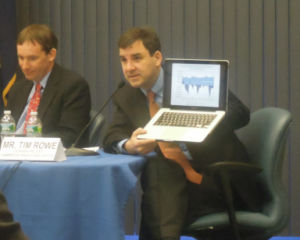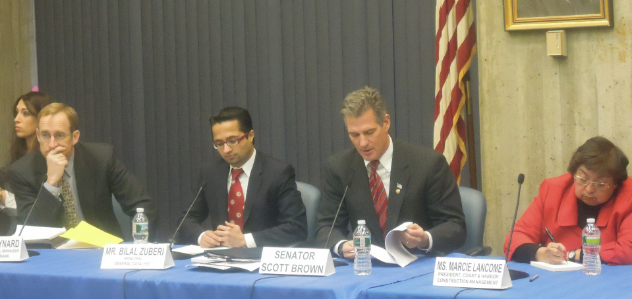At a panel today at Boston’s City Hall on “Accessing Capital for Small Business,” panel host and Republican U.S. Senator Scott Brown did more listening than talking.
The event kicked off at 9:30 this morning in a small, crowded room in City Hall filled with both traditional entrepreneurs and lenders as well as startup founders and investors. The first panel focused on lending for small businesses by community banks and private lenders, while the second one was designed to “focus on the state as an incubator for startups” as the event invitation put it.
During the startup-focused panel, participants put forth a number of thoughts and suggestions around innovation and capital formation, but here’s the short version: it’s a great time to be an entrepreneur in Massachusetts, but tax reform, immigration reform, changes to Sarbanes-Oxley, and the legalization of “crowdfunding” could make it even better.
The investment panel included Tim Rowe, Founder and CEO of the Cambridge Innovation Center, Colin Angle, Co-Founder and CEO of iRobot, Marcie Lancome, President of Coast & Harbor Construction Management, Jim Maynard, Northeast Regional Manager of Silicon Valley Bank, and Bilal Zuberi, Principal at General Catalyst.
“I have never been more excited about the state of innovation [in Massachusetts],” said Zuberi, noting that he has lived in the state for 16 years. “It’s the one state where we can very easily say that we are leaders in innovation in many different industries.”
Maynard was similarly optimistic, reporting an uptick in deals from 2010 to 2011.
“We’ve seen some very good activity, and it’s encouraging,” he said.
Asked what challenges startups currently face accessing capital, Zuberi highlighted the role that “crowdfunding”could play in providing young entrepreneurs with small amounts of capital to begin their business. Rowe concurred, suggesting that it was ridiculous that it’s legal “to take an unreasonable risk at the race track” but not to invest in a neighbor’s startup.

Rowe and Zuberi also both highlighted immigration reform as an area for improvement, arguing that providing more would-be entrepreneurs with Visas would improve the nation’s innovation economy.
Panelists also suggested reforms to Sarbanes-Oxley that would make it easier for companies to go public as well as a more simplified and predictable tax code.
I found it notable that panelists focused more on tax complexity and predictability than on rates. Angle suggested that continuing resolutions – the stop-gap legislative tactic Congress has increasingly used to fund the government – create significant uncertainty and thereby harm businesses.
Brown agreed, saying “You don’t need a three to six to nine month plan. We need a three to six to nine year plan.”
While there’s a lot to be said for politicians listening to suggestions from the business community, I have to say I had hoped to hear more from Brown himself. Given that he is in a tight race with presumed challenger Elizabeth Warren, it would have been great to have heard his vision for how the federal government can promote innovation.
But this panel surely provided critical input to his and his staff’s thinking on innovation policy. Hopefully we’ll hear more on how he’s thinking about it between now and November.

